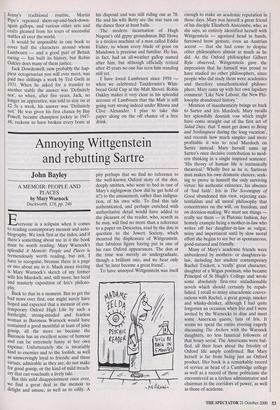Annoying Wittgenstein and rebutting Sartre
John Bayley
A MEMOIR: PEOPLE AND PLACES by Mary Warnock Duckworth, £18, pp. 246 Everyone is a solipsist when it comes to reading contemporary memoir and auto- biography. We look first at the index, and if there's something about me in it the book must be worth reading. Mary Warnock's splendid A Memoir: People and Places is tremendously worth reading, but not, I have to recognise, because there is a page or two about me in it. Much more riveting is Mary Warnock's sketch of my former wife Iris Murdoch, and, still more, her lucid and masterly exposition of Iris's philoso- phy.
Back to that in a moment. But to get the bad news over first, one might surely have hoped and expected that a memoir of con- temporary Oxford High Life by such a forthright, strong-minded and fearless woman as Baroness Warnock would have contained a good mouthful at least of juicy gossip, all the more so because the Baroness has an excellent sense of humour and can be extremely funny at her own expense. Unfortunately she is invariably kind to enemies and to the foolish, as well as unswervingly loyal to friends; and these virtues, admirable as they are, do not make for good gossip, or the kind of mild treach- ery that can vouchsafe a lively tale.
But this mild disappointment once over, we find a great deal in the memoir to delight and amuse, as well as to edify. A pity perhaps that we find no reference to the well-known Oxford story of the don, deeply smitten, who went to bed in one of Mary's nightgowns (how did he get hold of it?) to the amusement, rather than indigna- tion, of his own wife. To find this tale authenticated, and perhaps enriched with authoritative detail would have added to the pleasure of the reader, who, search as he may, will find no more than a reference to a paper on Descartes, read by the don in question to the Jowett Society, which incurred the displeasure of Wittgenstein, that fabulous figure having put in one of his rare Oxford appearances. The don at the time was merely an undergraduate, though a brilliant one, and we hear only that 'he later became a great friend'.
To have annoyed Wittgenstein was itself enough to make an academic reputation in those days. Mary was herself a great friend of his disciple Elizabeth Anscombe, who, as she says, so entirely identified herself with Wittgenstein — agonised head in hands, furrowed brow gesture, even an Austrian accent — that she had come to despise other philosophers almost as much as he did. As the Oxford philosopher Gilbert Ryle observed, Wittgenstein gave the impression that he himself was proud to have studied no other philosophers, since people who did study them were academics and therefore unauthenticated philoso- phers. Mary sums up with her own lapidary comment: 'Like New Labour, the New Phi- losophy abandoned history.'
Mention of inauthenticity brings us back to Sartre and Iris Murdoch. Mary recalls her splendidly donnish vow which might have come straight out of the first act of Salad Days, that 'I must get down to Being and Nothingness during the long vacation', and records how much simpler and more profitable it was to read Murdoch on Sartre instead. Mary herself sums up Sartre's once decisive contribution to mod- ern thinking in a single inspired sentence: `His theory of human life is intrinsically theatrical.' Wholly free as he is, Sartrean man makes his own dramatic choices, seek- ing to prove in himself the only surviving virtue: his authentic existence, his absence of 'bad faith'. Iris in The Sovereignty of Good abandoned this view, rejecting exis- tentialism and all moral philosophy that concentrates on the will, on freedom, and on decision-making. We must see things really see them — in Platonic fashion, her homely example being a mother-in-law who writes off her daughter-in-law as vulgar, noisy and impertinent until by slow moral effort she begins to see her as spontaneous, good-natured and friendly.
Many of Mary's academic friends were unburdened by mothers- or daughters-in- law, including her student contemporary Rachel Trickett, a 'really' great character, daughter of a Wigan postman, who became Principal of St Hugh's College and wrote some absolutely first-rate unfashionable novels which should certainly be repub- lished. I recall so many unacademic conver- sations with Rachel, a great gossip, smoker and whisky-drinker, although I had quite forgotten an occasion when Iris and I were invited by the Warnocks to dine and meet some American guests, fans of Iris. It seems we spent the entire evening eagerly discussing The Archers with the Warnock daughters, no less fanatical followers of that hoary serial. The Americans were baf- fled, all their fears about the frivolity of Oxford life amply confirmed. But Mary herself is far from being just an Oxford product. Her book is a remarkable record of service as head of a Cambridge college as well as a record of those politicians she encountered as a tireless administrator and chairman in the corridors of power, as well as those of academe.

























































































 Previous page
Previous page